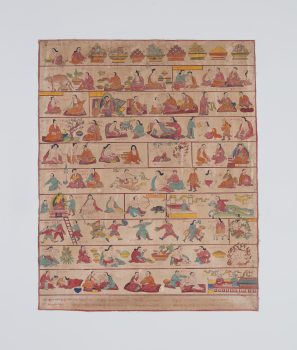Central Tibet
19th century


Central Tibet
19th century


While the primary religious goal for followers of Buddhism is enlightenment, many of the practices also serve secular goals related to daily life, including ethical conduct and cultivating well-being.
Teachings and precepts that offer practical and experiential guidance. In Buddhism instruction is primarily an oral tradition and is often targeted to the specific needs or disposition of a student or disciple.
Today, Tibetans primarily inhabit the Tibetan Plateau, situated between the Himalayan mountain range and the Indian subcontinent to the west, Chinese cultural regions to the east, and Mongolian cultural regions to the northeast. During the 7th to 9th century, Tibetan rulers expanded their empire across Central Asia, and established Buddhism as the state religion.
Get the latest news and stories from the Rubin, plus occasional information on how to support our work.